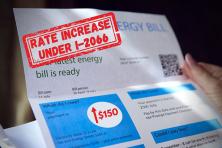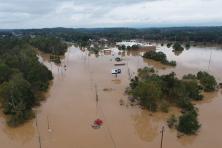Reflecting on our collective anxiety… and responding
The coronavirus pandemic has become top priority for every institution of our society, including government, business, education, and family life. As newly isolated individuals and families reorient our lives and routines, anxious about our own health and that of vulnerable family members and neighbors, we all find ourselves coping with an unfamiliar collective anxiety and grief.
In this moment, many climate writers are also drawing parallels between COVID-19 and our climate emergency—another crisis which is often easier to ignore, but no less devastatingly global. In an essay headlined “What climate grief taught me about coronavirus,” Mary Annaïse Heglar writes that “my climate grief and my grief about the coronavirus pandemic feel devastatingly similar. Both crises...force me to accept the end of something big and precious and irreplaceable. And I don’t know what comes next.“
Somini Sengupta writes that both the climate crisis and COVID-19 call for international cooperation and bold policy change. “Because we are bad as individuals at thinking about tomorrow,” she writes, “economists and psychologists say it’s all the more important to have leaders enact policies that enable us to protect ourselves against future risk.”
What would a just and sustainable economic response to coronavirus look like? “In the short term, recovery; in the long term, resilience and renewal,” David Roberts suggests in a detailed set of proposals. Bill McKibben also makes a case for federal action.
What comes next
In her extraordinary book A Paradise Built in Hell, Rebecca Solnit writes: “When all the ordinary divides and patterns are shattered, people step up—not all, but the great preponderance—to become their brothers’ keepers. And that purposefulness and connectedness brings joy even amidst death, chaos, fear and loss. Were we to know and believe this, our sense of what is possible at any time might change. We speak of self-fulfilling prophesies, but any belief that is acted on makes the world in its image.”
As communities around the world come to terms with the scale and potential longevity of the coronavirus crisis, many organizations are working to provide opportunities to assist and protect vulnerable people. These include ways specifically to support low-income folks and elders, recent immigrants, shuttered small businesses, people coping with mental illness, overworked first responders, performing artists, and other communities hard-hit by this pandemic. Ways to help are multiplying quickly, and it is impossible to provide an adequate list even for our own region. However, here are a few resources worth knowing about. We’ll be offering more ways to support others in the weeks to come.
Want to do something about coronavirus? Here are five ideas (Vox)
Northwest regional resources for mutual aid; direct assistance to needy families (It’s Going Down)
Portland-area community resources (KBOO)
Coronavirus causes in Seattle (Seattle Times)
Seattle-area community resources (350 Seattle)
Coronavirus Small Business Resources (Small Business Administration)
Support for performing musicians (NW Folklife)
Washington and Oregon legislative sessions ended earlier this month; here’s a brief recap of the results for climate and clean energy.
After a Republican walkout brought Oregon’s legislative session to an end without action on climate, Governor Kate Brown took matters into her own hands—reclaiming climate leadership with an executive order setting new, science-based goals for reducing emissions, and directing state agencies to pursue action to cut climate-harming pollution.
While the Washington legislature approved new, strengthened climate targets, it failed to pass clean fuels legislation that would have addressed the state’s largest source of emissions: transportation. Advocates are already planning for next year, when they will continue efforts to reduce transportation emissions.





